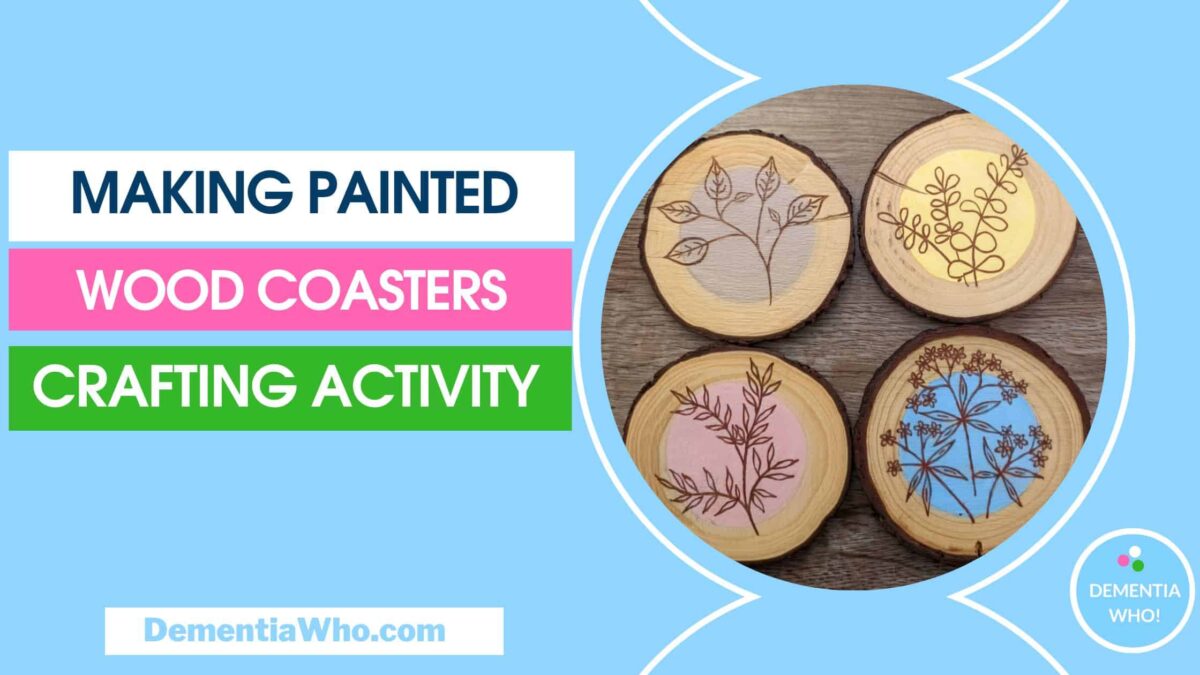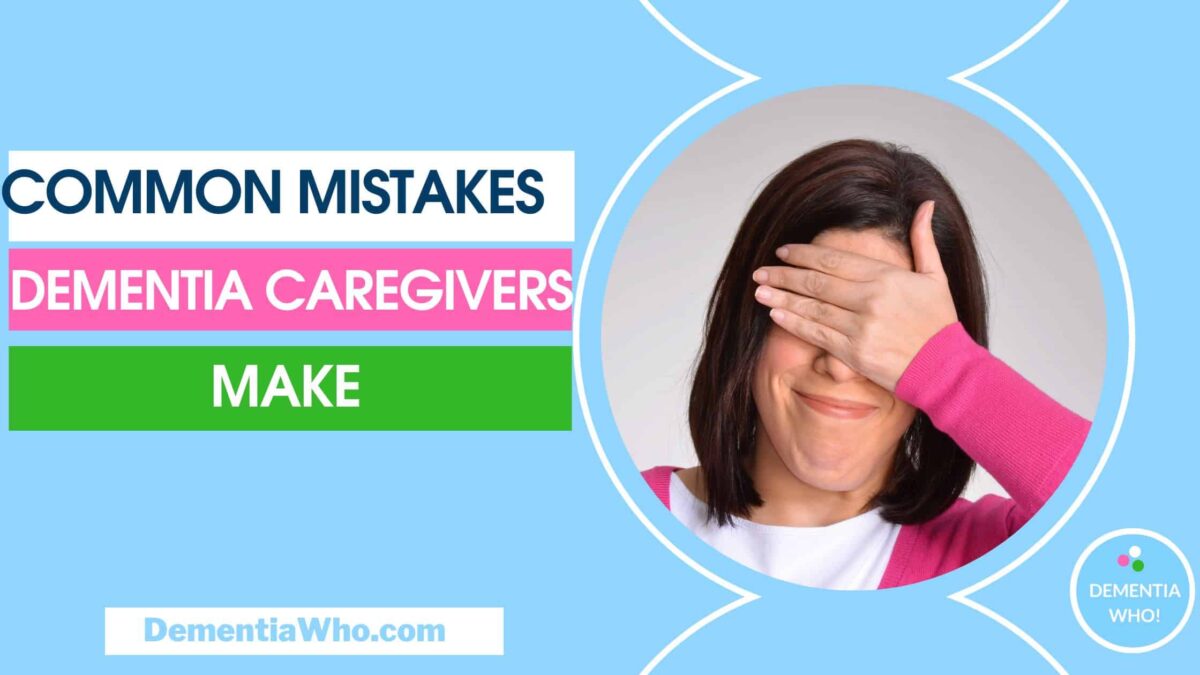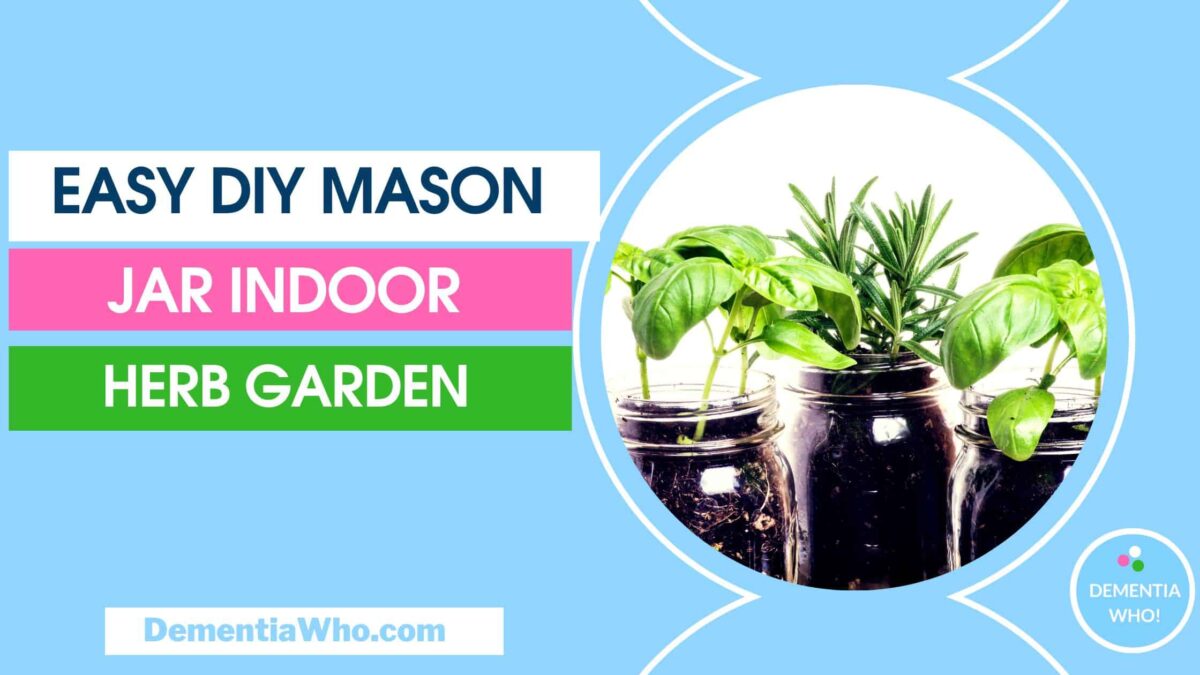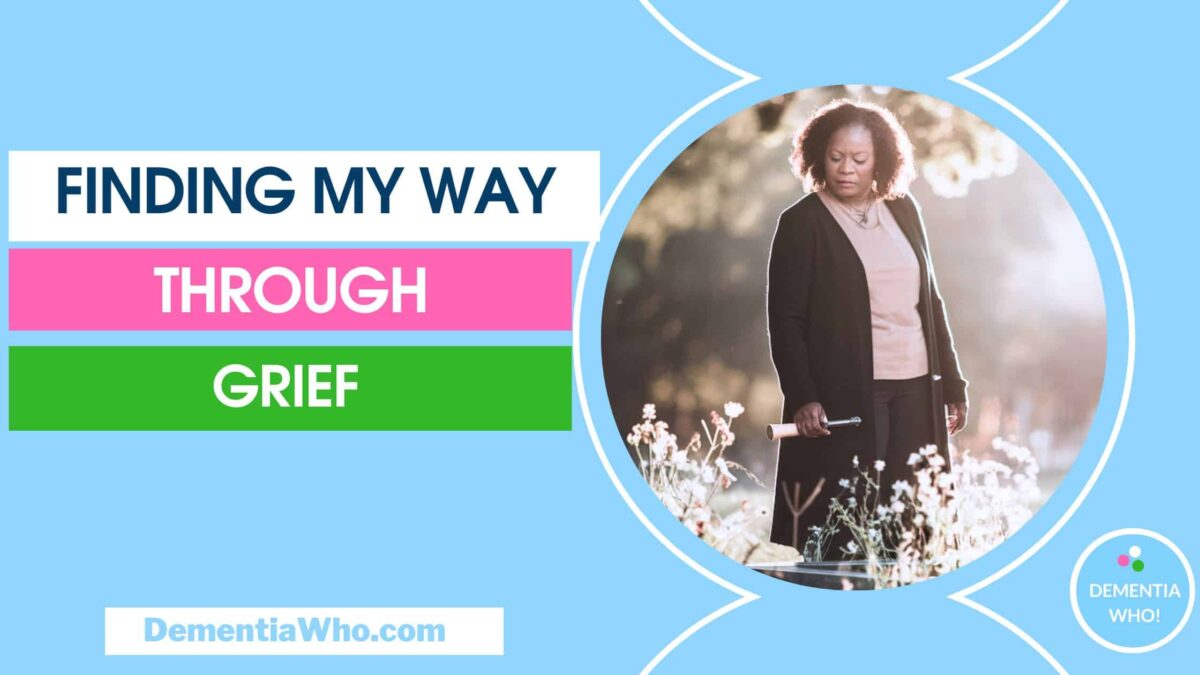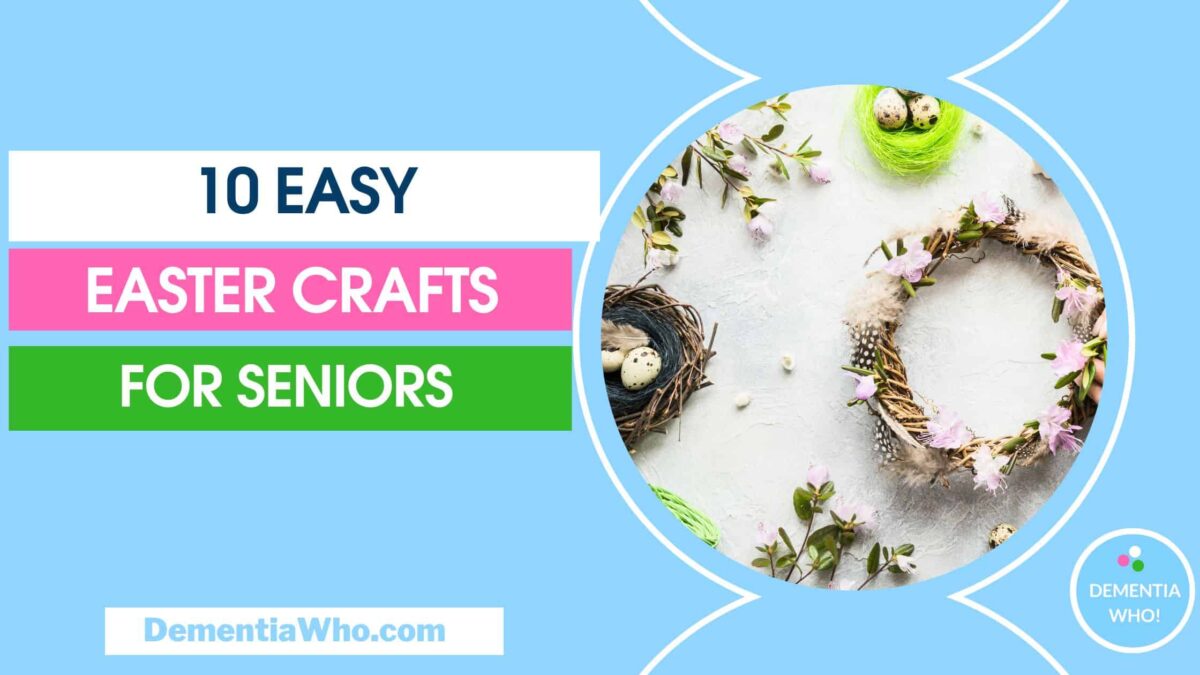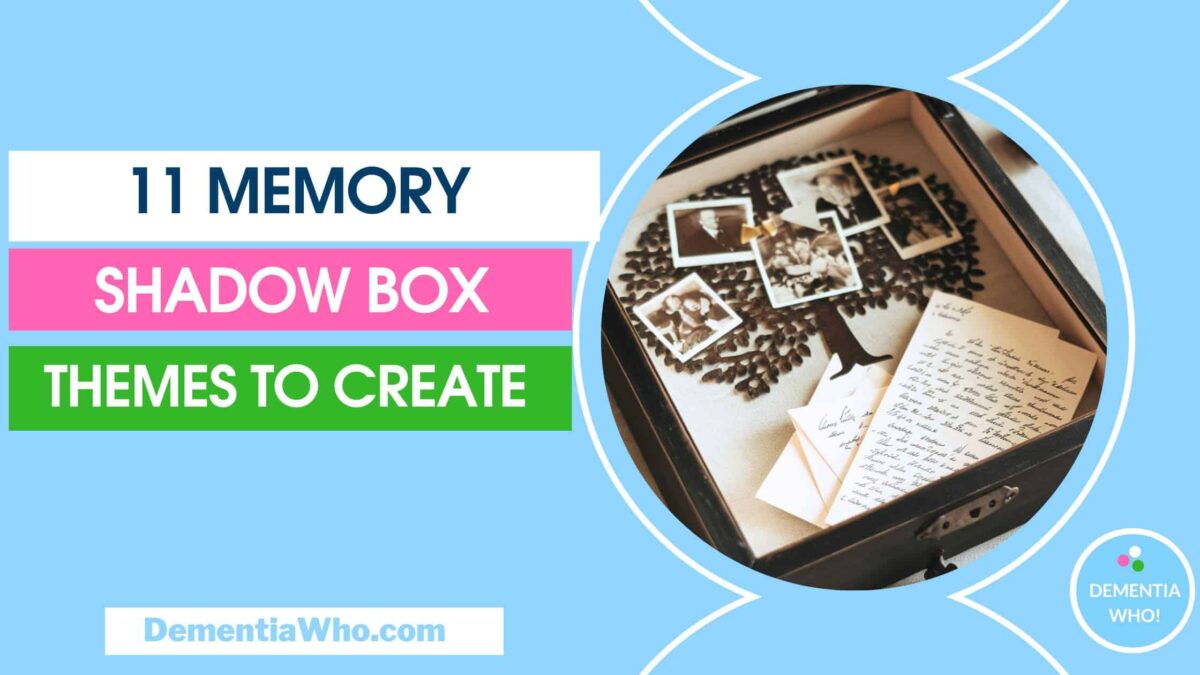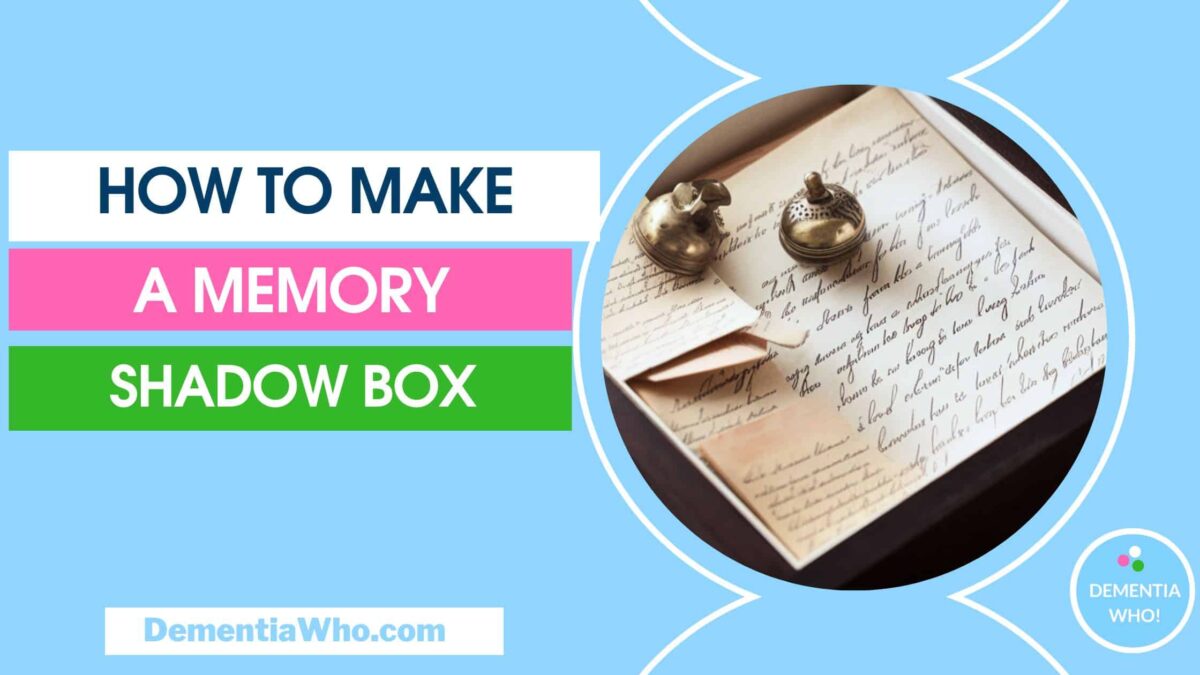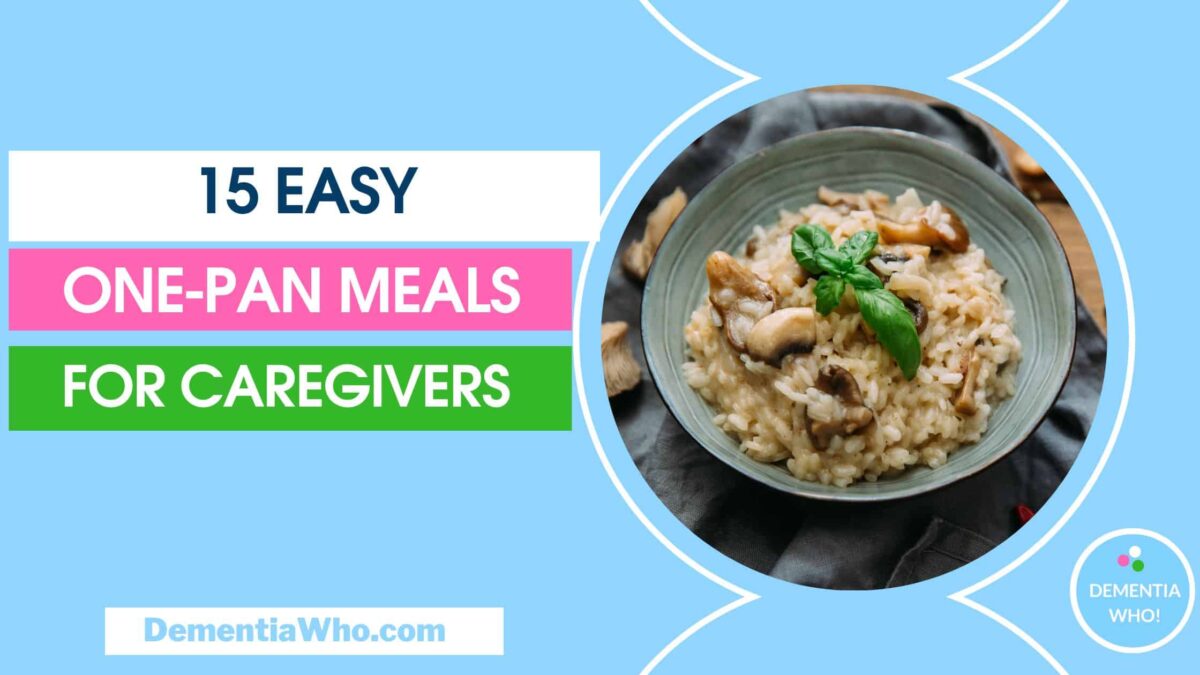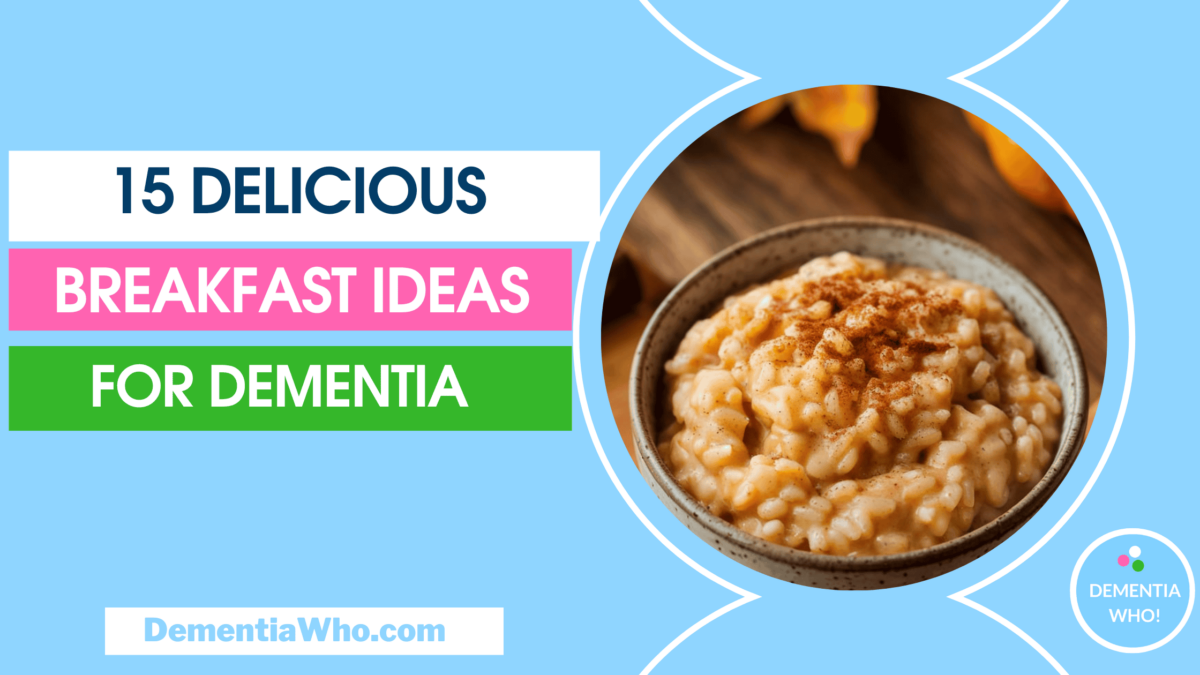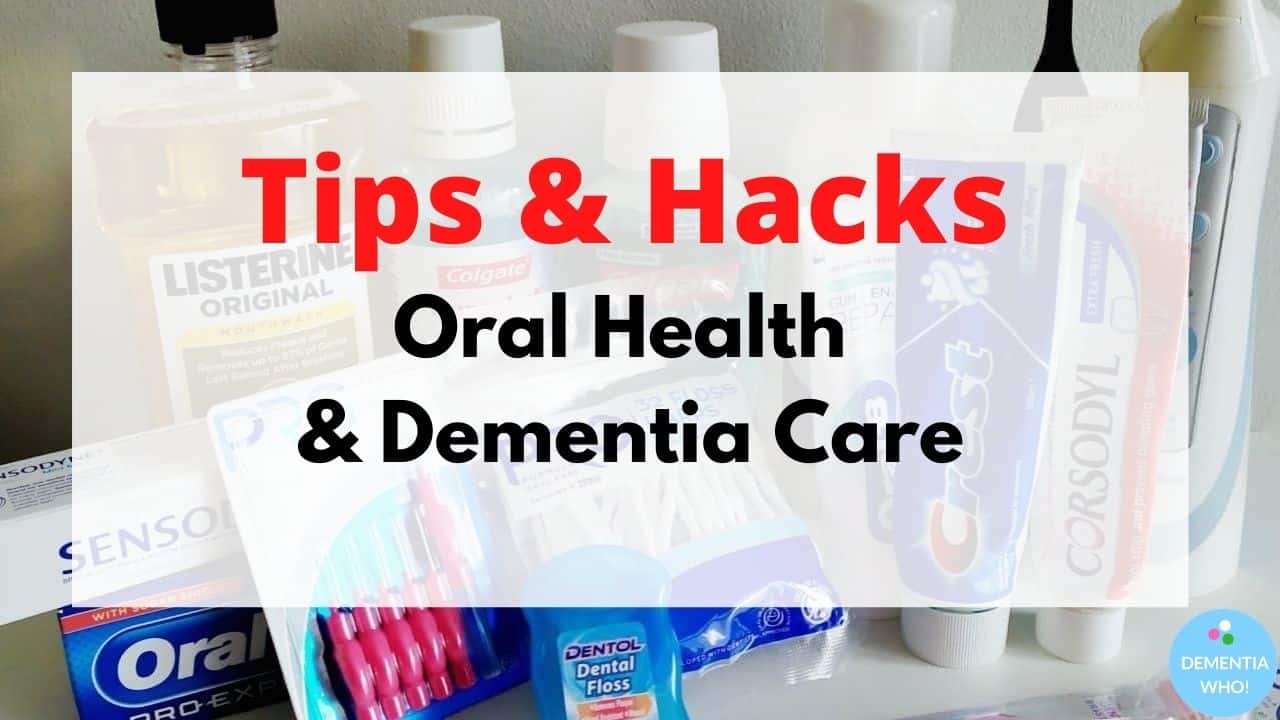
Are you taking care of someone with dementia and looking for Dental Care Tips & Hacks for Dementia to improve dental hygiene?
Dental care for those with dementia will vary depending on the person concerned, on the type of dementia they have and what stage they are in their progression.
Here’s a helpful guide on Dental Care Tips & Hacks for Dementia & Caregivers that can help promote independence. It’s full of tools and methods to support your loved one’s oral health & hygiene routine.
Gum health is particularly important. The bacteria from gum disease and periodontal disease can enter the bloodstream and travel to other areas of the body and lead to serious health issues. Poor gum health has been linked to cardiovascular disease, cancer, respiratory diseases, diabetes etc. It’s even been linked to the development of Alzheimer’s.
What are the Signs of Dental Distress for Dementia Caregivers?
What are the signs of dental or oral care distress? Ask yourself, is the person living with dementia showing any signs of discomfort or pain or acting differently?
Things to look out for as a caregiver can include:-
- Eating less and reacting to hot or cold food/drinks
- Only eating on one side of their mouth
- Holding the side of their face or pulling at their face
- Rocking back and forth
- Grimacing or pulling faces
- Making soft meowing noises
- Becoming withdrawn and not interested in activities
- Change in temperament, or mood, showing signs of aggression
– which could be a way of communicating that there is an underlying issue.
Listen to what’s being said & watch out for signs of discomfort or pain in their body language.
10 Dental Care Strategies for people with Dementia
- Set yourself reminders
- try using post-it note reminders
- using a mobile phone calendar/to-do list
- using voice assistants like Alexa, or Google Home etc., to say, e.g. ”Time to brush your teeth.”
- Make sure you have a clear path to the bathroom and labelling to find your toothbrush & paste easily
- leave your toothbrush and paste out by the sink
- Or label the cupboard if you store them hidden away
- label the door of the bathroom door and leave the door open for the line of sight
- Relocate out of the bathroom
- If you can’t get to the bathroom, do what I do for my mum! Ask your caregiver to bring you a bowl for spitting, a cup of lukewarm water, and teeth hygiene tools (brush, paste, floss etc.) so you can brush your teeth where you are.
- Otherwise, you can also go somewhere closer, like the kitchen sink.
- Instruction Sheet
- Write down the steps involved in brushing your teeth or get a caregiver to do it and pin that up somewhere you can see it. You can download a free template of instructions here, Dementia Brushing My Teeth Reminder PDF. It includes a blank template for you to write in your steps if you prefer.
- Brush at Different Times
- Try brushing at a time that’s more manageable for you, try for at least twice a day, that could be at 6 pm and not bedtime, as long as it is after your last meal
- Go Electronic!
- Switch to an electric toothbrush with a timer to remind you when to stop or a powered water flosser (this may be too much for some individuals!)
- Use a mirror or mimic each other
- If it’s not too upsetting, use a mirror to see what you are doing or do it as a joint activity so that you can mimic their behaviour.
- Use a smaller soft-bristled toothbrush.
- Smaller brushes are less invasive & easier to manoeuvre. My mum used a child’s toothbrush as it was easier to manoeuvre, before finding a small head soft bristle adult toothbrush
- Rinse your mouth after eating
- Try to rinse your mouth out after every meal if possible to reduce bacteria build-up and clean away food debris
- Mouth Wipes
- You can also buy mouth wipes shaped like finger sleeves to wipe teeth and mouth pockets if tooth brushing becomes more difficult.
9 Dental Care Tips & Hacks for Dementia Caregivers
There are several ways caregivers can help someone with dementia in their dental care routine & maintaining their oral health. You can try these Dental Care Tips & Hacks for Dementia Caregivers.
- Leading by example
- Brush your teeth together so they can mirror your behaviour, remember to SMILE and use encouraging words. I do this every day with my mum; otherwise, she would stop brushing after 20 secs!
- Maintain a routine time for brushing teeth twice a day
- Brush when the person your supporting prefers to, whether that be before or after breakfast (before is recommended to wash away the bacteria overnight growth) or early evening after supper? Don’t just assume their routine is the same as your routine.
- Build a strong habit now
- Get into the habit of doing those finicky things we sometimes miss, like flossing and mouth washing steps, whilst they are more likely to accept it. (We added in mouthwash in mum’s routine as it wasn’t something she did before)
- Avoid irritating teeth hygiene products.
- There are many kinds of toothpaste & mouthwashes with various qualities that can irritate someone with dementia. For example, some can feel like they’re burning, others foam too much, some tingle, etc. Your mouth becomes more sensitive as we age; it’s essential to find the right product at the right time for your loved one.
- Use toothpaste free of Sodium Lauryl Sulfate (SLS) for less foam and alcohol-free mouthwashes for less of a sting -Kingfisher, OraNurse, some Sensodyne, and Aloe Dent are all brands that sell SLS free toothpaste
- Try less toothpaste, you only need a small pea-size amount, and that will reduce foaming
- Use a fluoride toothpaste and don’t rinse after brushing
- between 1,350 to 1,500ppm fluoride are the most effective for adults, according to the NHS
- Try not to rinse for at least 20mins after brushing teeth to maintain the fluoride on the teeth. Alternatively, you can try rinsing with fluoride mouthwash instead of water.
- Use teeth hygiene tools to clean between teeth.
- Use interdental toothbrushes (these are great when you’re supporting someone to do for them) or individual dental floss picks.
- These are great for dislodging food in the gaps between teeth. I’m always surprised by what we find even after brushing mum’s teeth!
- Create a safe environment and use effective communication
- Try to make it fun, play the music they like and talk about shared interests etc.
- A mirror and a chair and can help you brush someone’s teeth from behind them.
- Could you help them to open their mouth?
- If someone doesn’t open their mouth, you can ease their tension by massaging their jawline to relax the muscles.
- Apply a little toothpaste on their lips to help them remember the sensation and smell to encourage them to open their mouth
- Or try placing the back of the toothbrush against their mouth and then manoeuvre it around against their teeth, as you do, that may open the mouth slightly to get the brush in!
- Are they too weak? Can you help by supporting their hand, or are they resistive?
- Try the hand over hand approach to guide them, as demonstrated here in this video “How to Help a Person Living with Dementia Brush their Teeth” by Teepa Snow.
Keep reading for more caregiver dental care tips & hacks!
9 Dental Care Hacks for Dementia Caregivers
These Dental Care Tips & Hacks for Dementia Caregivers are aimed at making life easier for those with dementia.
People with dementia may have issues with memory, language, thought processes e.g Alzheimers, or those that affect balance, body coordination or vision e.g Posterior cortical atrophy (PCA) or other issues from the many different types of dementia.
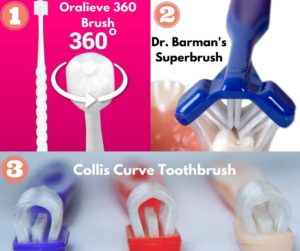
- 360-degree toothbrush – Oralieve 360 Brush is a specially designed toothbrush with a 360-degree head that can clean, remove debris from teeth, inside cheeks and pocket areas. It’s a soft-bristled brush with an easy-grip handle.
- 3 sided Toothbrush – Dr Barman’s 3 sided toothbrush allows the user to brushes all sides of their teeth all at once, saving you time and making sure all surfaces are brushed! This can be particularly handy if issues with their dexterity or short attention span for those with dementia.
- A curved bristle brush – Collis Curve toothbrush also cleans multiple surfaces and can be easier to tolerate and shortens the time needed to brush the teeth as both sides are brushed at the same time. These brushes are also used for special needs adults/children who may find it hard to brush with an ordinary toothbrush.
- Grip Supports – You may have issues with gripping the toothbrush, and there are several hacks here to help with that. You can use a stress ball, foam sponge, pipe insulation, tennis ball, large elastic bands fitted on the handle as a way to improve the grip of a manual toothbrush.
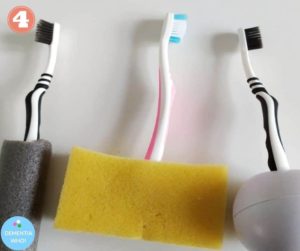
- Xylitol – can help reduce bacteria and acid in the mouth as it is a non-fermentable sugar alcohol. It’s primarily used as a sweetener and can be found in crystal form or found in gum or candies. It can also increase saliva, which can also help with teeth remineralisation. Various studies are talking about the efficacy of Xylitol. One study states that Xylitol “decreases the incidence of dental caries by increasing salivary flow and pH13 and reducing the number of cariogenic (MS) and periodontopathic (Helicobacter pylori) bacteria, plaque levels, xerostomia, gingival inflammation, and erosion of teeth”. Try chewing Xylitol gum – Be careful of choking issues or try rinsing with it by dissolving crystals in your mouth

- Floss loop -If you have trouble holding floss, tear a piece and tie it into a loop and use it like that. Alternatively, you can use floss sticks or interdental brushes.
- Sulcus toothbrush – a sulcus toothbrush is an ultra-soft brush with just two rows of bristle used to clean the gum line. This can be particularly good for those who don’t clean their gum line well and susceptible to gum diseases. You can also use a Sulcra brush (interspace toothbrush) to clean in between teeth.
- Arm Support – if you have difficulty holding a toothbrush without support, then try using a shelf or a stack of books to support your arm whilst brushing your teeth or instead bring your head down to your hand, then brush your teeth.
- Swap to an electric toothbrush which by design has a larger handle and can help with better grip
Dental Care Tips & Hacks for Dementia & Caregivers when taking Medication
Certain types of medication can reduce saliva production. Some medicines can also cause a dry mouth which can make it harder to eat or swallow.
Why is saliva important for oral health? Saliva is crucial for washing away food & breaking down bacteria in the mouth improving gum health, helping with the remineralisation of tooth enamel, and keeping your mouth comfortable.
If you don’t keep your mouth hydrated, you’re more likely to develop bad breath, tooth decay and gum problems. So what can you do to combat dry mouth technically known as xerostomia?
- Consult your doctor
- they can prescribe saliva mimicking sprays (Synthetic Saliva), gels or pastilles to keep your mouth moisturised.
- Drinking more water
- can help in the short term to relieve discomfort, try sipping water regularly.
- Chew on sugar-free gum, sugar-free sweets or candy or specifically for increasing hydration.
- a new product has been developed to help – Jelly Drops are sugar-free sweets designed to increase water intake
- Avoid drinking through a straw
- Avoid caffeinated drinks or soft drinks.
- Always rinse your mouth out after using an inhaler
- Use a humidifier at night or a bowl of water on a radiator to moisten the air in your bedroom
- Moisten dry foods with broths or sauces
- eat moisture-rich fruit and veg like celery, watermelon etc
When my mother switched to a new medication, she began to suffer from severe dry mouth. Whatever we tried, nothing helped! We didn’t realise that the drug was the cause (despite the leaflet saying it caused dry mouth!)
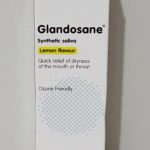
After talking to our doctor, he prescribed a synthetic saliva spray which helped to combat the problem. Please make sure they specify one that isn’t acidic. Neutral saliva spray would have a PH of 7, but we had a PH of 5.75, Glandosane, which would class it as acidic. However, numerous websites refer to it as neutral! Consult your doctor & dentist if it’s an ongoing problem!
Dental Care Tips & Hacks for Dementia dealing with Dentures
- Remove dentures and brush with a product designed for cleaning them, don’t use toothpaste as it’s too abrasive.
- Make sure you clean thoroughly any metal parts and parts that fit against your tissue in your mouth, like the roof of your mouth and gum line.
- Soak the dentures a cleaning solution to remove stubborn stains and disinfect them
- Make sure to clean your gums and soft tissue in the mouth with a soft brush, help clear away debris and bacteria, and stimulate your gums.
Be careful how you handle them, as they may break if dropped. You can clean dentures over a towel or a bowl of water in the sink. It always a good idea to get your dentures labelled either by your dentist or yourself.
Dental Care Tips & Hacks for Dementia when Visiting the Dentist
Getting to know your dentist in the early stages is a lot easier, but it may become more challenging as the disease progresses.
So it’s important to learn now what the limitations are and to put plans in place to make visits easier.
Dentists can spot the first signs of issues or find issues that are causing pain now, so what tips can help for a better visit:-
- Develop a rapport with your dentist, get to know him and allow time for them to get to know you.
- Explain the situation and likely behaviour outcomes of any particular actions they may undertake
- Make a note of what works and doesn’t work each visit to have a record of possible problem areas.
- Try to put together a dental plan to try to offset any issues.
- Get a fluoride varnish put on if they feel it’s required to reduce decay.
- Always get teeth cleaned at every session so that any areas missed by toothbrushing can be deep cleaned.
- Ask to be in the room to give reassurance whilst dental care is being given.
If you’re lucky, you’ll be working with a dentist that has taken some dementia training.
Training can provide an understanding of dementia care, like the need to use simple & clear instructions. They’ll work with low levels of noise & limit interruptions & allow caregivers to be present etc.
These dentists learn that being patient, really listening and making minor adjustments to the way they work makes for a better dental visit for someone with dementia.
Listen to this dentist who understands the issues after undertaking dementia training.
If it becomes too hard to visit your dentist, ask for a referral to a community dental service specialising in working with people with dementia or other disabilities.
Diet and Dental Care
All of this is pointless without a well-balanced diet rich in vitamins and low on sugar-laden treats. Reducing sugar-laden treats and carbohydrates will help.
Various foods like apples, celery, strawberries, and cheese have different qualities that can support your dental health, from stimulating saliva to being a natural whitener or supporting tooth enamel. If you have a relative anything like my mum, you will have difficulty prising those biscuits away. Just make sure they rinse out their mouth with water after, as that reduces the impact on teeth.
Wrap Up!
Nothing has changed whether you have dementia or not you need to have good oral care to prevent cavities, gum disease, tooth loss and more.
The only difference is that your loved one may not always be able to tell you of their pain or discomfort particularly in the latter stages of the disease. They may need help in ensuring they have the right tools, support, and encouragement to carry out their oral routine.
If they develop problems, it can stop them from eating, cause distress and if not treated could lead to further damage.
If your loved one is in the early stages of dementia, they may need little or no help. During the middle stages, they may need some assistance & guidance and during the later stages, they may need you to supervise or do the task with/for them.
So, It’s vitally important that you balance the need for independence and support.
The longer a person with dementia is able to take care of their own teeth, the longer they’ll maintain that memory.
Remember that!
Disclaimer: This information is not a substitute or replacement for medical advice and/or dental treatment from your dentist.

